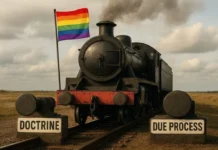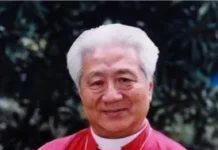America’s first major denominational transgender bishop, professing to be a “they,” was consecrated in San Francisco this past Saturday amid religious and political officials in a hyper politically correct rite claiming precedent with biblical eunuchs.
This transgender bishop signifies liberal Protestantism’s ongoing rejection of not just traditional Christian sexual teachings but also of physical reality, as part of God’s created order, to be replaced with the primacy of self-created identity.
The Rev. Dr. Megan Marie Rohrer was installed on September 11 as the fifth bishop of the Evangelical Lutheran Church in America’s (ELCA) San Francisco-based Sierra Pacific Synod. The synod includes 200 congregations across northern California and northern Nevada.
The ELCA remains the largest Lutheran body in North America at 3.26 million members, despite shedding more than 1 million members — or 25% of membership — across the last reporting decade, down from 5,288,048 members at the denomination’s founding in 1987.
ELCA Presiding Bishop Elizabeth Eaton served as the lead consecrator and preacher at the service hosted by the Episcopal Church’s Grace Cathedral, of which the ELCA is in full communion.
Ordained as a minister in 2006 as “the first openly transgender/non-binary person to be ordained by the Evangelical Lutheran Church in America” the new bishop has now been touted by the synod as the first transgender person to be elected to that position. Rohrer, a biological female, neither identifies as a woman nor as a transgender man and uses as a pronoun the singular “they”.
Because the ELCA did not ordain transgender persons before 2009, Rohrer and six other gay and transgender pastors from the Bay Area were ordained by Extraordinary Lutheran Ministries. Those ordinations were recognized by the ELCA in 2010 after the Churchwide Assembly voted to allow partnered gay persons (Rohrer previously identified as lesbian) to serve as clergy.
Saturday’s service began with a “land acknowledgement” declaring “the land where we live and worship in this place is stolen land.”
“We are on the unseated lands of the ones we know today as the Ohlone people,” stated participant Janet Katari. “We acknowledge the historic violence and genocide against indigenous siblings and ancestors as well as the harm that the U.S. government continues to perpetuate. We pray that this church’s continued work towards justice and the necessary cessation and dismantling of the colonial structures we continue to inhabit.”
Participants in the ceremony atop San Francisco’s historically wealthy Nob Hill neighborhood were encouraged to “find concrete ways to make reparations to the original stewards of these places and their descendants.”
Congregants were invited to stand as clergy gathered around the orchid-festooned baptismal font, giving thanks as decanters poured water from the Sacramento and Garcia rivers, Lake Tahoe and the San Francisco Bay as acolytes waved blue streamers overhead.
“You, oh God: Parent, Child, and Holy Breath. You are the water we crave,” Eaton pronounced. “You, oh God: Rain, Estuary, and Sea. You are life for us all, now and forever. Amen.”
The service welcomed numerous local political officials, including California Lt. Governor Eleni Kounalakis, a California state senator, San Francisco’s Police Chief, Fire Chief, and San Francisco Democratic Party Chair Honey Mahogany, the party’s first transgender leader.
“This is a feast day of the first transgender saint, St. Theodora,” introduced San Francisco Supervisor Rafael Mandelman, proclaiming himself a gay Jewish agnostic, personal friend to Rohrer and one of several elected officials present for the installation. “Bishop Rohrer is the first transgender bishop of a mainline Christian denomination in the United States, and for all the fear and tragedy of the last 20 years, it is undeniable that there has been light in changing social notions and laws within institutions religious and secular throughout this country and world. So it brings me a lot of hope and joy to celebrate history of another kind on this day.”
A theme of eunuchs began with a scripture reading of Acts chapter 8 in which Philip meets the Ethiopian eunuch. Rohrer earlier this year criticized the Council of Nicea, tweeting in May about the fourth century council that set parameters of Christian doctrine.
“The first council of Nicaea’s first action was to try to limit the leadership roles of trans pastors and bishops,” Rohrer wrote, an apparent reference to Canon 1 from the council declaring eunuchs can be priests unless they castrate themselves. “I’m grateful the Lutherans of the @sps_elca are beginning to dismantle this and some of the other hurdles BIPOC and LGBTQ pastors encounter.”
In her sermon message, Bishop Eaton noted that Jesus Christ’s identity as both fully human and fully divine were not an “either/or” but a “both/and”.
“This bishop [Rohrer] is sometimes a paradox themselves. This bishop one would automatically consider [to be] some crazy, radical person. But how do we, when we try to sort into either/or, square that with the fact that they are a chaplain with the San Francisco police department?” Eaton asked. “This chaplain, your bishop, stands with them and prays with them.”
Eaton challenged those viewing the installation service remotely to continue watching in the months ahead.
“You’re going to see a grace-filled, Gospel preaching, Jesus-loving servant of the Word serving everyone, all people. You’re gonna see someone and a synod being transformed in order to invite people into the complete, the infinite, and the intimate love of God,” Eaton predicted. “We’ll continue to work for those on the margins … we do it surrounded by so great a cloud of witnesses and we do it by a God who was not either/or but both divine and human, seemingly weak but unbelievably strong, seemingly marred and humiliated but creating an act of indescribable beauty.”
Immediately following her presentation as the ELCA’s newest bishop, Rohrer recited paraphrased words of the poet Maya Angelou: “They may write me down in history with their bitter twisted lies, trod me down in the very dirt, but still like dust, I rise, rising from the past of history’s shame out of the past of all the things that bring shame, I rise.”
Gesturing to quilts hanging from cathedral arches, Rohrer named Episcopal, Presbyterian and Methodist ecumenical partners demanding medications during the AIDS crisis, marching to end racism, housing refugees and rebuilding homes destroyed by wildfires.
“You knew God’s up to something — not because I sit here with a bigger hat now, but because courageous people voted a new way: ‘behold a new thing is happening.’”
The service concluded with Rohrer celebrating Holy Communion, unfencing the table by inviting all present to participate.
“I hope that my body reminds you that nobody is unwelcome from this table,” Rohrer pronounced. “All are welcome to celebrate communion with us.”



